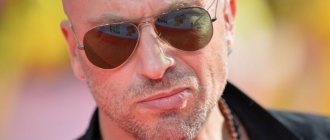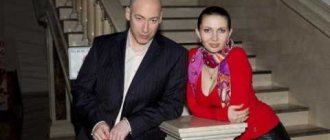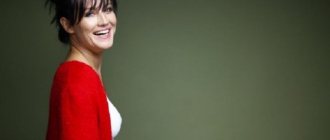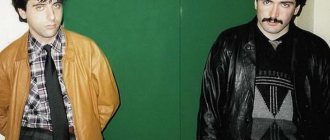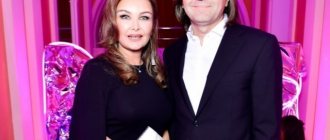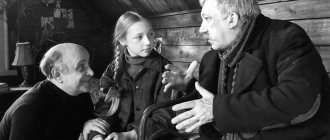Childhood
Dmitry Bykov was born into an intelligent Moscow family. His mother, Natalya Iosifovna Bykova, taught Russian language and literature at school. Father, Lev Iosifovich Zilbeltrud, is an otolaryngologist with a Candidate of Medical Sciences degree.
The marriage of Dmitry’s parents did not work out, and after the divorce, Natalya Iosifovna raised her son alone.
Dmitry studied well, and in 1984 he graduated from school with a gold medal, after which he entered the prestigious Faculty of Journalism at Moscow State University without any problems, but did not manage to graduate from the university - he was called up for military service in 1987. After serving, Bykov continued his studies at Moscow State University and graduated with honors in 1991.
Irina Lukyanova commented on the situation
The journalist and writer wrote a post on her Facebook account, addressing fans of her husband who were interested in his health. She said that she does not have exact information - only the attending physicians and higher authorities know this.
Lukyanova asked those who are not indifferent to Dmitry Lvovich’s condition not to bother the writer’s relatives with questions, since they simply do not have time for this. She separately asked to leave Bykov’s mother alone.
Photo: @denissberegiss
At the end of the publication, Irina reported the most important thing about her husband’s well-being, confirming with words about “medical sleep” reports about a coma:
“All that is important: a) he is in the hospital b) his condition is serious c) he is in a medical sleep d) the doctors are professional, thanks to them e) Ufa doctors are in constant contact with the Ministry of Health and Moscow colleagues e) no help is needed yet (but still thanks to everyone who suggested it). But prayers for health, of course, are needed.” (The author’s spelling and punctuation are retained hereinafter, editor’s note.)
Journalistic activity
In 1985, Dmitry Bykov became a columnist for the Soviet weekly Sobesednik. In the 90s, he collaborated with a large number of printed publications in Moscow: “Evening Club”, “Ogonyok”, “Seven Days”, “Capital” and others.
In 2000, the journalist received the position of creative editor of Sobesednik. From the end of 2002 to June 2003, he was deputy editor-in-chief of the Konservator newspaper, then became editor of the Culture department, and later of the Society department in the Ogonyok magazine. Since 2007 – columnist for the magazine “Russian Life”. In 2010, Dmitry Bykov was awarded the “Golden Pen of Russia” prize from the Union of Journalists.
Dmitry Bykov: biography and personal life
Dmitry Lvovich Bykov was born on December 20, 1967 in the capital of the USSR in the family of doctor Lev Iosifovich Zilbertrud and teacher of literature and Russian language Natalya Iosifovna Bykova.
The parents divorced soon after Dmitry’s birth, and Natalia took upon herself entirely the upbringing of the boy. From his mother, Bykov received not only his last name, but also his love for the Russian language, oratory and writing. We can safely say that Dmitry’s success in adult life is the fruit of the example and good upbringing of his mother. Even in his childhood, the future writer showed himself to be an intelligent and disciplined person. He studied “excellently” at school, received a gold medal and easily entered the Faculty of Journalism, Department of Literary Criticism at Moscow State University. From his third year, he was drafted into the army for two years, after which he completed his studies at the university and received a red diploma.
During his student years, he demonstrated a love of literature and became a member of a poetry club. At the age of 18 (from his first year), he actively wrote for the newspaper Sobesednik, and after graduating in 1991 he became a member of the USSR Writers' Union. Already in 92, he began active work on radio and television, while simultaneously conducting educational activities in schools and universities. According to Dmitry himself, he has always considered teaching the most useful and meaningful of his activities, and he does it with great pleasure.
Dmitry Bykov is married three times. From his second marriage to Irina Vladimirovna Lukyanova, he left two children - a daughter and a son. In 2020, the 52-year-old writer married a young 22-year-old Moscow State University graduate, Ekaterina Teimurazovna Kevkhishvili. Dmitry describes the development of his relationship with her in the story “Alienators.”
Creation
Dmitry Bykov is a famous prose writer and poet, author of the new literary genre “rhymed prose.” His main literary directions are biographies of great people (Boris Pasternak, Bulat Okudzhava, Vladimir Mayakovsky), fiction and documentary prose.
In the hungry nineties, Dmitry Bykov wrote several novels based on popular Western films under the pseudonym Matthew Bull. The most famous creations of this period: “66 Days”, “Wild Orchid 2”, “Harley and Marlboro”.
Dmitry Bykov's bibliography includes several collections of poems, novels and fairy tales. A separate collection published journalistic works on culture, art and politics.
Thus, in 2005, a collection of political pamphlets, “How Putin Became President of the United States: New Russian Fairy Tales,” was published. A satirical account of the events of 1999–2001, written in the spirit of Saltykov-Shchedrin and Maxim Gorky.
The most famous novels by Dmitry Bykov: “Spelling”, “Tow Truck”, “ZhD”, “Written Off”, “Ostromov, or the Sorcerer’s Apprentice”, “X”, “Signals”, “Boris Pasternak”. Dmitry also wrote two collections of zoological stories in collaboration with his wife and writer Irina Lukyanova.
In collaboration with Vitaly Mansky, Bykov wrote the script for the documentary film “Virginity” with the notorious Karina Barbie (released in 2008). In 2010, a collection of Bykov’s dramatic works was published.
Dmitry Bykov's wife - photo
Dmitry met his wife at work. It was an office romance. Dmitry and Irina wrote a column together in the Sobesednik newspaper. It was necessary to write an article about Boris Grebenshchikov. Irina wrote her part, which Dmitry really liked. Bykov added several paragraphs and, in his words, “there were no seams visible.” They immediately realized that they needed to be together - both work and live.
Dmitry Bykov and his wife are raising a son, Andrei, and a daughter, Evgenia. Bykov is an emotional, hot-tempered person, but thanks to the balanced, restrained Siberian character of his wife, there are no quarrels and swearing in the house. The children of Irina and Dmitry grow up in a calm, favorable environment, in a creative atmosphere. Dmitry is very grateful to his wife for her patience and care for him and their children.
Dmitry Bykov himself adopted a love of literature from his mother. Natalya Bykova was a teacher of Russian language and literature. She raised her son alone. And now, by their example, Dmitry Bykov and his wife are raising in their children a love of reading and writing. The photo of Dmitry Bykov’s wife radiates kindness and feminine wisdom. Bykov's wife is a friend and close person for him. In an interview, he said that a loving husband and wife must “suffer from the same mental illness,” that a wife is not a cook or a critic, but, first of all, a kindred spirit who thinks in the same direction. Also, the interests of a husband and wife must be similar.
As textbooks on family life, Bykov recommends unexpected works - “Anna Karenina”, “The Honeymoon” by de Coster, “The Road Goes Away” by Alexandra Brushtein, “Child of the Epoch” by Zhitinsky, the works of Zola (as negative examples). Bykov's most famous novels are “Spelling”, “Tow Truck”, “ZhD”, “Written Off”, “X”, “Signals”, “Boris Pasternak”. In collaboration with his wife Irina Lukyanova, Dmitry Bykov wrote several zoological stories and two children's books. In the nineties, Bykov wrote several novels - “66 Days”, “Wild Orchid-2”, “Harley and Marlboro”. These works were published under the pseudonym Matthew Bull. For “Total Dictation – 2011” the text was written by Dmitry Bykov. Since 2020, he has been the host of the “Odin” program on the Ekho Moskvy radio station, also writes a column in Novaya Gazeta, and writes for Sobesednik. He often participates in opposition rallies; on the Internet you can see photographs of him next to another famous oppositionist, Navalny. Dmitry Bykov calls resistance “an interesting skill.” Dmitry's favorite place is Portland, Oregon, there is no winter there, it rains often and many of his friends live there. He is now 51 years old.
In an interview dedicated to his 50th birthday, Bykov expressed confidence that his health was not in danger, that he was from a family of long-livers and had never been seriously ill. In April 2020, Dmitry Bykov ended up in the hospital. He became ill on the plane, which was flying from Yekaterinburg to Ufa, where he was supposed to give a lecture. Rumors spread that he had a stroke. Later, this information was refuted; in fact, Dmitry was hospitalized due to diabetes. Bykov's wife said that his condition is showing positive dynamics. Dmitry's son Andrey is studying to become an actor and director.
Perhaps interesting: Yuri's wife Olesha, Oleg Dal's wife.
Radio and television
At the turn of the millennium, Dmitry Bykov became the host of several television projects: he hosted the program “Vremechko” on the TVC television channel (2000-2008), “Okay, BYkov” on the ATV channel (2000-2003). Since 2009, he has been the host of the “Born in the USSR” program on the “Nostalgia” channel. He also hosted the show “Oil Painting” on Channel Five (2010-2011). Since 2011 – host of “Flask of Time” on the “Nostalgia” channel.
From 2005 to 2013, Dmitry Bykov worked at radio stations - his original programs were aired on the frequencies of Yunost, City FM and Kommersant FM.
In 2011-2012, Bykov became the author of poems for the acclaimed media project “Citizen Poet” from the Dozhd TV channel. Bykov’s works were read by the famous artist Mikhail Efremov. The project quickly gained popularity, and its authors - Dmitry Bykov, Mikhail Efremov and producer Andrey Vasiliev - received the PolitProsvet award. But after issue 6, disagreements arose between them, and as a result the project was closed. Bykov continued to write poetry for the program “Good Mister.”
Social and political activities
Dmitry Bykov is known as an oppositionist and active public figure. In 2011, together with like-minded people, he organized the public movement “Vote against everyone!” and proposed to make the pig Nah-Nah the emblem of the movement. Soon this name became the name of the movement. In 2011 and 2012 he took part in protest rallies in Moscow.
Since 2012, Bykov, together with Yuri Shevchuk, Leonid Parfenov and Boris Akunin, became one of the founders of the League of Voters. Dmitry also joined the reformist Coordination Council of the Russian Opposition, taking second place in the list of members after Alexei Navalny.
Prizes and awards
Dmitry Bykov is the winner of many prestigious literary awards, which cannot be ignored when analyzing his income. He became the winner of the A. and B. Strugatsky International Literary Prize four times (in 2004, 2006, 2007 and 2013), the fund of which amounts to several hundred thousand rubles, and twice the winner of the “Big Snail” with a prize of 50 thousand rubles. But the largest literary prize can be called the “Big Book” - in 2006, Dmitry received 3,000,000 rubles for the biography of the writer Boris Pasternak, in 2011 - 1,000,000 rubles for the work "Ostromov, or the Sorcerer's Apprentice", in 2020 - 1 000,000 rubles for the novel “June”. Thus, the popular Russian publicist clearly does not live a poor life, receiving significant income from the sale of his books, speeches, articles, courses, lectures and awards.
Personal life of Dmitry Bykov
Dmitry Lvovich is married. His wife Irina Lukyanova is a columnist for the Sobesednik newspaper, a writer and journalist. Her articles were published in the printed publications “Lomonosov”, “Career”, “City of Women” and “Peasant Woman”. Irina is the author of many works, two of which – “Animals and Little Animals” and “In the World of Tummy” – are the fruit of collaboration with her husband. The couple has two children.
Dmitry Bykov: “My wife has a Siberian character”
In an exclusive interview with our portal, teacher, journalist, writer, poet and citizen Dmitry Bykov spoke about the main industrial novel of his life, explained why he does not like the words “wife” and “husband,” and also named the most useful books about family relationships.
How do you feel about the very institution of civil marriage with the notorious stamp? How do you see the family of the future?
Civil marriage is a strange concept: in essence, any non-church marriage is civil, and the stamp, in my opinion, does not play a special role. A wedding is a decisive step, there is a completely different measure of responsibility. And a long-term family life, I think, does not require any registration. Depp and Paradis were an almost ideal family, they lived long and well - and, as far as I remember, were never married. I don’t think that the family will change so fundamentally in the future. It is the most enduring institution in human history. As John Wyndham wrote in Chocky, it takes two to make one. Some expansion of same-sex marriage is possible, but I think this is a matter of fashion.
Please tell us how and when you proposed to Irina Lukyanova?
I don't think there was any proposal. Somehow it was immediately clear that we needed to live and work together. I didn’t make an offer to write to her jointly either - I just had to write a column in Sobesednik, as I remember now, about BG, and Lukyanova quickly and efficiently drafted it - I only had to write a couple of paragraphs, and the seam was not visible. This was on the third day of our acquaintance.
Are you and your wife similar, or are we talking about the unity of opposites here?
They are very similar in mentality, but completely opposite in mentality. That is, important thoughts almost always come to us at the same time, we are very similar in literary and cinematic tastes (but not in musical ones: I never understood how one could love Freddie Mercury or the Scorpions, and Lukyanova, for example, cannot listen to Shostakovich at all). But Lukyanova has a classic Siberian character - restraint, constancy, directness. Lukyanova is very kind. Unfortunately, I cannot say all this about myself. She is many times more patient and enduring than me. She approaches everything very thoroughly. She loves to tinker with plants, including those in the dacha, and with animals, and although I do dacha things because it’s necessary, it’s only because I generally love the dacha and understand that I shouldn’t neglect it. In general, I have a bad character. I'll tell you more - I don't consider myself kind. That is, at heart I am kind, so I like to think, but in practice I am irritable, unfair, disgustingly selfish, etc. That is why I try to write more and enter into relationships with people less. My sociability is apparent. I'm better with letters.
Have you developed your own family traditions?
There are no special traditions, but not because we have theoretical beliefs in this regard. Everything works out by itself: New Year, Christmas, Easter must be celebrated together. There is a circle of friends who visit us and who we visit. There is a tradition of watching thrillers together (my son and I) and family comedies (Lukyanova and her daughter).
Do you and Irina have differences in matters of raising children? What do you consider the main thing in pedagogy?
My principle is very simple: you can only educate by personal example. We work a lot and don’t yell at each other a lot - I think this is the optimal way of parenting. Then, sometimes I start sporadically, frantically putting things in order, throwing away everything that seems unnecessary to me. The children learned to take this calmly, somewhat ironically. Previously, there would be a mad roar, snatching out some garbage jewelry, etc. Since then, I have stopped teaching them cleanliness and ordering their life - I even like the subtle, complex chaos that they, led by their wife, establish at home. It’s enough for me that there is nothing superfluous on the desktop and that the books I need for work are in their usual places.
Together with your wife, you wrote children’s books “In the World of Tummy Time” and “Animals and Little Animals.” How did the co-creation process work?
What we both can’t stand is the terrible word “wife,” which sounds like a cross between pike perch and beluga. And the cow word “muuuzh” still seems alien to me. As for the general profession, Marya Vasilyevna Rozanova, godmother of our Andrei, says that the most lasting romance is industrial. I agree with this. It seems to me that complete mutual understanding is only possible with a person of similar interests - not necessarily a common profession, but close to it. Lukyanova’s greatest fear—this is a phrase from one of her letters immediately after meeting—was that “life would turn into a production meeting.” But this, in my opinion, is the best option. Collaborative writing always happens the same way: a story is invented, and then everyone writes down the part of it that is closer to them. In “Animals and Little Animals” the seams are also not visible, but, of course, most of the animal stories are mine, and the bestial ones are Irkin’s. In “Tummy”, I myself don’t remember now who wrote what.
What works of world literature would you recommend as textbooks on family life?
"Anna Karenina", perhaps. “The Honeymoon” by de Coster, my favorite writer in general. Much from Zola, although these are mostly negative examples. “The Road Goes Away” by Alexandra Brushtein. Stories by Susanna Georgievskaya. “Child of the Epoch” by Zhitinsky.
Photo: Maxim Burlak, Alla Kozachenko, Maxim Shadrin
Dmitry Bykov today
Dmitry Bykov continues to work in print media and on television, and he is also a member of the Coordination Council of the Russian Opposition.
In 2014, his new novel “The Quarter” was published. Passage”, in 2015 - a collection of poetry “Clear”, and in 2020 Dmitry Bykov released the book “I am a wombat” for the series “Entertaining Zoology”.
Since 2020, he has been hosting the “Odin” program on radio “Echo of Moscow” and has his own column in “Novaya Gazeta”.
On April 17, 2020, he was hospitalized in serious condition during a tour in Ufa. It was reported that the writer fell into a coma after a stroke. Bykov's representatives denied that he had a stroke - according to the official version, the reason for hospitalization was the consequences of diabetes. The writer himself believes that the reason for his hospitalization was acute poisoning. Dmitry Lvovich’s ability to work is amazing - while still lying in a hospital bed, he recorded new episodes of the program for Echo of Moscow. On April 30, Bykov was discharged.
Dmitry Bykov. And what does he think about himself?!
Share:
It seems like I've been waiting for this interview my whole life. I once wrote on Snob, “The sexiest thing that happens to me is Bykov’s lectures,” and raked everyone in the comments. For years and years I read and listened, breathed in time with his every word. And there really is an erotic subtext to this, because you breathe and breathe, and it keeps affecting all sorts of zones in the brain that no one has reached, it crushes and twists, and then the climax always comes, and pleasure, and in general...
Listen to him again and again! - a complex meaning is revealed in an instant from a tight bud into a lush flower. You can mentally pin it to your chest, inhale the aroma, and carry it with you everywhere.
That's how we live. In order not to become exhausted in the race for a cash prize, we console ourselves with poetry and collect meanings. Bykov seems to be losing them all the time too, and you can literally see from the letters how painful it is for him when he loses them, and how joyful it is when he finds them. Always finds. Usually in literature.
On the 20th Dmitry Bykov will be 50, but these are conventions. This was an opportunity to find out about himself.
It seems that all he does is talk and write, express opinions, give assessments and forecasts, and in his lyrics he is exposed to the “burn surface” - we don’t know anything about him. Because no matter what Bykov talks about, he always talks not about himself, but about you. About something in you that you were afraid to approach, even mentally.
But sometimes I want about him, not about the lyrical hero, not about the poet and prose writer, publicist, teacher... But about Bykov in his head, about Bykov in childhood, about Bykov in slippers.
— How did you imagine yourself as an “adult” when you were little?
- For some reason, wearing glasses. And I really have become myopic over the years, about minus one to one and a half, but I don’t wear glasses. Although the Golden Ratio school gave me excellent, even, by all accounts, good ones. Otherwise, I guessed a lot, at least with regard to profession and circle of friends. As a child, I had few friends, because I studied at a rather specific school, such a major one, and I didn’t like it there. And then, as many do in childhood, I imagined these friends. Almost all of them - some even with the same names - subsequently appeared. In general, as a child I knew and understood many things better than I do now. Therefore, it seemed to me that “Benjamin Button” was made directly about me, and I cried for half the film, although I understood how much unnecessary there was in it.
This is also strange, by the way. Fincher made so many films, and so different! “Fight Club”, “Seven”, Oscar-winning “Button” for make-up and special effects, “Zodiac”, “The Girl with the Dragon Tattoo” and even “The Social Network” - but the cult director is still not him, but Tarantino. And although, in my opinion, he is a master on the level of Kubrick, he is somehow treated without aspiration, and when listing the main directors of the era, he is not the first to come to mind. Why? Either because he is professional in many areas, or because he always touches on subtle things that not everyone cares about and not everyone understands. “The Club” is precisely the poppiest of his films and appeals to bad people, who usually make up three-quarters of the audience.
— How did you imagine yourself to be 50 years old when you were 20, 30, 40 years old? How much of this are you now?
- See above. True, like most normal people, I hoped that after 50 I wouldn’t have to work as a journalist. Now I see that there is no escape from this, even though this is the work of young people. But, firstly, youth now is a loose and stretched concept. Secondly, Kabakov warned me that all journalists dream about this - and no one succeeds. And Kabakov understands the profession. And thirdly, this is not only a matter of money, but also of temperament. And if you don’t submit a column on Monday, a review on Wednesday, and an interview on Thursday, then where can you get the feeling that someone needs you?
— What will you be like at 70? Will the worries be the same as now?
— Polina, over the next 20 years so much will happen in the world that it will change beyond recognition. The question is whether I will live these 20 years. Physiologically, nothing threatens me - I come from a family of long-livers and have never been sick with anything except tonsillitis in childhood. So if all these social cataclysms - not so much Russian, but worldwide - do not affect me, I see myself about the same as now, only perhaps more bald. I hate this word and concept, and the fact that I am going bald from the forehead - “God adds intelligence,” as they say, in contrast to the humiliating bald spot on the back of my head - is of little comfort to me. But maybe by this time everything will have changed so much that baldness will be overcome?
To be honest, I would really like to live in the same apartment as now, I love it very much. But I would also like to have a small summer home, like a dacha, where I could spend time from about October to April. Somewhere by the sea, by the ocean. My favorite place is Portland, Oregon - it's just my favorite place in general, and there are a lot of friends there, and it often rains. A house there costs much less than a Moscow three-room apartment. And this is what I hope to somehow organize for myself, because winter gets boring over the years.
— If you were born into a different family (and your mother was, for example, a tram driver), would you still become what you became? Would you become a poet?
- Of course not. I would become a tram driver, most likely, but an advanced one, writing poetry and reading it to passengers... Then the profession of “tram driver” would gradually become unnecessary or marginal, and this would give me a powerful poetic impulse. The topic is mine, dear. And at the same time, I would fight for the rights of tram drivers, against the displacement of trams to the outskirts. Maybe I would write to the newspapers about this.
— Do you manage to do everything that is planned (for the day, for the year)?
- For a day - of course, because my profession is structured in such a way that texts must be submitted at a specific time, and lectures must also be read, and even more so, teaching at school. And I like to have a rigid schedule, although over the years I hope to reduce my office hours. And I never plan anything for the year.
— Can you say that, by and large, you are doing exactly what you want?
— As a child, I really wanted to make films and had a better idea of how to do it than now. Maybe this dream of mine - as always happens with dreams - will be realized by my son. He is being trained to be an actor and director. As for the rest - yes, I am doing approximately what I wanted, and even approximately the way I wanted. I will say more: some of the plots of my books were invented in childhood, and I did not realize all of those plans. Pasternak was right: the “bucket of spiritual depth” is located there. By the way, I will still make one film, I know this for sure - as far as one can know anything about oneself for sure. When - I have no idea.
— What is the priority? Literature, teaching, journalism?
- All this is literature, only in different genres.
— Do you write “out of inspiration” or “several pages a day”?
— Inspiration almost always appears in the process of work, on the fifth or sixth stanza or on the fifth or sixth paragraph. And since most of my texts are journalism or literary criticism, I do not have the luxury of writing from inspiration. In general, I usually write because of the main spiritual need - to solve some internal problem. There’s no time for inspiration here either – you don’t take pills when inspired, do you? This is a way to urgently relieve internal conflict, to calm down some kind of mental migraine.
— Does it happen that “it’s not written”? So what do you do then?
— In journalism, see above, there is no such luxury. And in literature, when I clearly know what I want to write, it always gets written. And when I don’t know, I always have something to do: I always have two or three literary studies books in the works, which I’m in no hurry to submit. It is thanks to this work that I do not have time for all sorts of destructive activities - for example, fighting on social networks.
— What was the longest period when you did not write? What were you doing then?
— I drove the car, as a rule. This happened during road trips to Crimea. The rest of the time I had to either write something in my room or prepare for lessons. And I generally write poetry every day, but I don’t always write down all sorts of nonsense.
— Were there times when you “gave up everything” and decided to become a janitor (and went on a drinking binge)? If so, which one was the longest?
— There wasn't and I hope there won't be. My profession is the main form of life, the only thing I’m good for, and I didn’t give up eating, for example? (to avoid false beauty like “breathe”). I had this poem “Self-portrait against the background” - “Honey, look at this photo. Take a closer look, without getting angry or rude: you will see him as an idiot who has found himself from the first days. Closed eyebrows, as if at a funeral feast, plump cheeks, a bristly oval... It is clear that the question of the meaning of life never bothered him.”
— Should an artist be hungry? And when does money matter to you?
- In all. How can they not matter? There are things that I am ready to do for free - as, in fact, I do: all the so-called serious literature brings me almost no income, but the pleasure pays for any waste of effort. As for hungry artists, this is such nonsense that it’s embarrassing to even discuss it. An artist must have such a profession—in the sense of earning a living—so that it does not stifle him, leaves him time and energy for art, and so that while painting he does not have to constantly draw in the margins the figures of his debts or approximate expenses for food. In this sense, the optimal profession for a writer is teaching or journalism, as it is in the States. And for someone who knows how to draw or play musical instruments, earning money is not a problem at all, in my opinion.
— Why does an artist need a couple (woman, man, partner)? What is the purpose of the one who is nearby?
— Fields, everyone needs a pair. As Kushner once said, everything that is true about an ordinary person is true of a writer, it’s just that we are in the public eye. The one who is nearby does not owe anything to anyone, and he has his own purpose - there is no need to turn his wife into a critic, a cook, or a nurse. But there just needs to be a person nearby who is similar to you in some important way, who understands. I said just now - in a lecture about Mandelstam and Rudakov - that real intimacy does not come when you read the same books, but when you are sick with the same disease, preferably mental.
— Is it important for you to be praised? And whose assessment of your text matters to you?
- Again, it’s important for everyone. Unfortunately, any assessment matters, even the assessment of an idiot: an artist is always tempted to believe the worst, just like a carpenter, however, if he is a good, self-critical carpenter.
- How many times can you love in life? And is it worth rushing into a new love if the “old” one is alive?
- It's not the same for everybody. For some it is a need, for others it destroys them. I don’t have such a need, I found mine. But who can vouch for themselves? If James Bond were Russian, the film would be called "Never Say Gop."
And you can love many times, but you don’t have to break into a new romance. Sometimes everything can be lived theoretically. As Stephen King tells Tabitha, “A dieter has the right to look through the menu.”
— What do you think about compromising with yourself? Are they killing relationships? Self-respect?
- They kill, of course.
— If you had to choose: a woman with whom eternal, intoxicating sex is possible, or a woman with whom eternal, intoxicating, but only spiritual kinship is possible, who would you choose?
- False choice. I have never had delightful sex with a woman who was alien to me in every other way. Sex is generally a human thing, and not entirely an animal thing. “Intimacy” by Patrick Chéreau is about this, in particular. Humanity will find a loophole everywhere and turn physical education into an act of spiritual intimacy.
—What is the purpose of literature? What is the point if the phenomena ridiculed by Griboyedov, Gogol, Saltykov-Shchedrin bloom in full bloom, and Bunin’s stories lead to suicide?
— The purpose of literature is to remain from life: everything else, as we see, is perishable. Well, more music. As Rezo Gigineishvili correctly said, all art is beautiful to the extent that it tries to resemble music.
— Is it worth reading literature “because it’s useful” and forcing yourself to read something that everyone has already liked and is “definitely good”?
— It’s generally better to force yourself to a minimum. “Life is too short to waste it on something you don’t like,” Tsunetomo . And everything you do against your will also shortens your life. There are days when I don't feel like going anywhere. Then I don't go. I make up reasons, support myself with certificates, and somehow manage to get out. But I'm not going. Violence against oneself causes the worst diseases. From external violence, by the way, too, but internal violence is more destructive.
- Why do people read poetry?
- For pleasure. Everything else, by the way, is done for the same purpose, but with poetry it often works.
— Is it possible to gain life experience from literature? And not make the same mistake, for example, as the hero of the novel you read? Or, in the situation described in the novel, behave in accordance with the book’s ideas about what is right and what is wrong?
— I think it can only be gleaned from literature, but some know how to use this information, while others do not. I learn from literature not so much methods as circumstances, and in these circumstances I make a decision. Other people's heroes and their actions, as a rule, serve me not for choice, but for self-justification.
— What is the relationship between true talent, contribution to literature and popularity, people’s love, and fees, in the end? Does time put everything in its place? Will all true talents receive recognition, even posthumously, and will all mediocrity be forgotten? How does this usually happen?
— This is something I think about a lot, including in connection with Fincher. Vladimir Novikov came up with the wonderful science of gloriology - about the ways to gain fame and the reasons for its departure. In some cases, it is still not clear: Is Khlebnikov a mediocrity, a madman or a genius? How talented is Yesenin? Is Dostoevsky a great writer or just a publicist? Time does not always put everything in its place. Or it must take a really long time. Fortunately, there are always niches in which not the most famous authors can hide: there is always a reader in whom your books fall, whose emotions coincide with yours. Zhitinsky and Slepakova are not the most famous writers during their lifetime (and after death), but my world was largely shaped by them, and my literature too. In general, I don’t really like those who everyone likes. This is not because of nonconformism, but I’m simply always part of some 8-14 percent. This applies to political, taste, and literary preferences.
- What of yours will remain for centuries? What will posterity quote?
— Everything remains in the centuries, because the methods of storing information are becoming more and more advanced. I have no idea what the descendants will quote, because they usually quote what is in tune with their sentiments, and sentiments depend on the circumstances. This has nothing to do with the quality of the literature. How many people today quote Hawthorne, Thoreau, Melville? But the named authors are no worse for this. It is in Russia that circumstances and characters are mostly unchanged, and it is rather a disease. But everything in the world has changed a lot, Hoffmann says little to today’s German, Akutagawa to the Japanese, even Mao is not relevant for every Chinese. And frankly, I would be glad if new heroes, circumstances, emotions appeared in Russia, so that some of the satire would finally become outdated, so that it would be possible not to constantly refer to situations of the 19th century... In my opinion, this will finally happen, and just in the next 20 years.
— Brodsky said something like “If you don’t smoke in the morning, then there’s no need to wake up.” Should an artist take care of his health and, for example, not abuse it, or should his job be to express himself as fully as possible (and if this is necessary, then resort to alcohol, drugs, etc.)?
— Taking care of your health is usually useless. It either exists or it doesn’t. The same applies to money: a person who is supposed to be rich will always get rich from scratch, and a person who is given just enough to survive (and, thank God, no less) should not claim more.
— Do you ever have a feeling of failure, complete failure? If so, how do you deal with it?
— It’s easier for a writer: if there is a feeling of failure, he can rewrite. Khabensky once told me: it’s easier for a theater actor than for a film actor. We can always play differently the day after tomorrow. (And for a writer, he added gloomily, it’s even easier: if you write poorly, no one will see. You can simply not publish). I've never published things I don't like. Well, in public speaking, as a rule, I carefully calculate the effect - so, thank God, there are no feelings of failure here. True, there are always people who try to convince you: old man, it was a failure. As a rule, the appearance of such people is a sign of good luck.
- Do stupid people annoy you? (Who is the most?)
- They are annoying, of course, but I always remember an English aphorism, I don’t remember whose: if they weren’t fools, we would have to...
— Is it true that you can only eat dumplings, don’t drink alcoholic beverages at all, and everyday comfort doesn’t matter to you?
— Household comfort is of great importance to me, but my requirements for this comfort are quite simple: the computer should be such that it is comfortable to work with, the keyboard should be the kind I’m used to, sitting in front of the computer should not be in a chair, it’s relaxing, — but on a rather hard chair. In the previous Sobesednik building I had an ideal office, ideal working conditions, and at home now it’s about the same. Things should be in their place. The bed must be made. There should be no unnecessary items lying on the floor or table. Actually, nothing should be lying around at all. This is distracting, thoughts about entropy appear. The dumplings are all very different, the phrase “the same dumplings” is incorrect. My food preferences, unlike my literary ones, are classified.
I drink very little alcohol: there are situations when I want to drink a hundred grams of absinthe, and sometimes half a liter of beer, preferably red, and I also really love Blue Moon, I’m ready to drink it almost any time, but especially in the heat. I don’t feel sad after beer, but after other alcohol I feel terrible sadness, so I don’t miss it. Kalmyk tea - yes, it’s an addiction, Weller and Uspensky got me hooked, and since then I’ve been a fan of it.
Exclusively for listeners of the lecture “Direct Speech” (thanks for the opportunity for public publication)
PHOTO by Maria Andreeva

